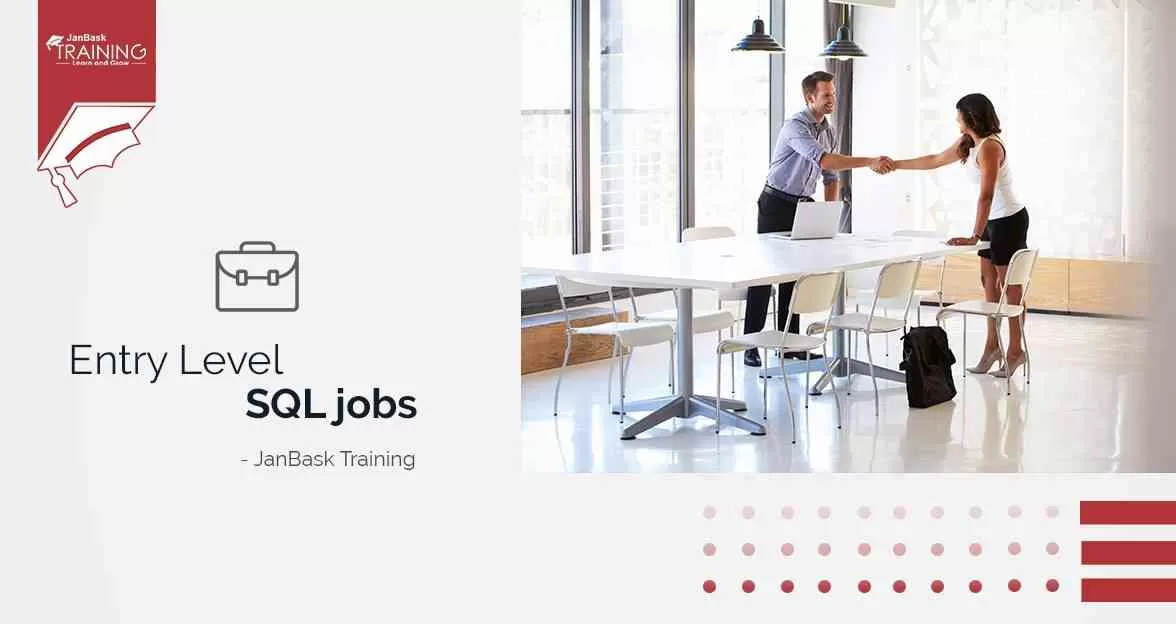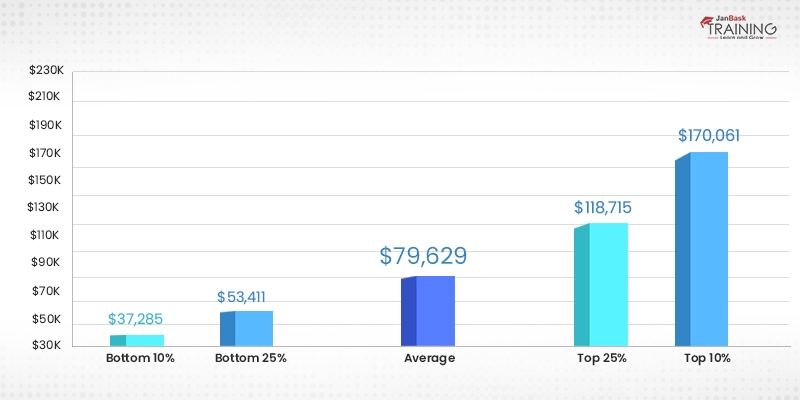Introduction
A career in the database is highly promising because every industry relies upon databases. From traditional companies to high-tech industries, databases are used to track a wide range of data. Jennie has worked in Software quality testing for more than 2 years. Now, she is thinking of a career transition. Well, after software testing, she was looking for a job that pays well and is easy to learn. (She wants to learn side-by-side of her regular job). She got to know about the SQL programming language. Online research lets her understand that SQL is the skill that offers a great work environment, flexible timetables, like-minded team members, and…. a great salary. Beginning her career with this back-end technology as an entry-level SQL job will pay her little less as compared to senior-level SQL jobs. Is this a hoax or reality? Read on to know what exactly we’ll be talking about in this blog. Let’s get started with everything about SQL entry-level jobs
Who is a Programmer in Entry Level SQL Jobs
Entry-level SQL programmers are the most youthful and least-experienced gathering of the other levels of programmers. We have stated the most youthful here basically on the grounds that this gathering is generally made out of ongoing college graduates (or individuals who are still in their second or third year of college) who are prepared to take on a genuine test in a real work environment. Honestly, be that as it may – there are many individuals who might qualify for this gathering who have no conventional training, at all. These individuals are in luck – over the long haul, an ever-increasing number of bosses turn their backs to the "formal instruction" necessity and are happy with an individual that has completed a couple of online courses or read a few books. Potential managers today take a gander at an individual's character – with time and patience, abilities can be educated. The same can't be said about character attributes.

The entry-level SQL programmer compensation is normally a considerable amount lower than that of junior or senior programmer jobs. Normally, the fundamental purpose behind this is the distinction in aptitude level, however, there are additionally different factors included. Some wannabe SQL programmers just get down to business in an organization since they have to pass a type of a subject in school (college). These understudies are typically anything besides roused – and that goes to appear.
Other than that, the greatest thing that an entry-level SQL programmer needs to do is learn. The vast majority of this current individual's undertakings will revolve around learning and becoming more acquainted with the entirety of the tropes of the business.
Brush your SQL concepts with our experts created SQL self-learning module
Learn SQL Server in the Easiest Way
- Learn from the videos
- Learn anytime anywhere
- Pocket-friendly mode of learning
- Complimentary eBook available
Qualifications Required for Entry Level SQL Jobs
- Masters Degree in Computer Science (CS), Information System (IS), Management of Information System (MIS), Engineering, Statistics, Data Analytics, etc. Anyone of these is preferable.
- 0-1 years of practical involvement in MS SQL Server
- Essential information on Data Modeling
- Essential information on SQL programming utilizing MS SQL-Server, T-SQL, SSIS and SSRS
- Essential information on SSIS ETL development
- SSRS Reporting Services
- Innovative, adaptable, and snappy to learn
- Great communication and logical abilities
- Capacity to work in a group environment and customer interfacing abilities.
Significant roles of SQL programmer in entry level SQL jobs
The truth about entry level SQL developer jobs is that it's a really huge area. There are many different types of DBA and many specializations.

Being in Development, you will perform:
- Index tuning
- Query tuning
- Schema design
Being in Core, you will perform:
- Backups
- Daily maintenance
- Monthly maintenance
- Normal incidents
- Major incidents
Being in Platform, you will perform:
- Virtualization
- Server builds
- Storage design
What are the responsibilities of an entry-level SQL programmer?

Utilizing the SQL coding language, an entry-level SQL programmer plans tables, composes queries, and guarantees that these inquiries perform at ideal velocities. Most SQL programmers are either database overseers or specialists in overseeing database development. There are various kinds of SQL relying upon the stage you use, however, they all play out a similar fundamental capacity to recover, include, alter, and erase database information. Also, an SQL programmer will be knowledgeable in these capacities.
- Checking on query execution and improving code
- Composing queries utilized for front-end applications (sites, work area applications, or cloud applications)
- Structuring and coding database tables to store the application's information
- Data modeling with application to envision database structure
- Working with application engineers to make upgraded queries
- Making database triggers for robotization, e.g., programmed email warnings
- Making table files to improve database execution
- Programming views, stored procedures, and capacities
Major roles of a SQL programmer in SQL Entry Level Jobs
Entry-level SQL programmers can make straightforward queries that don't require an excess of cutting edge code. For example, he can make basic queries that recover client data; however, they presumably won't have the option to make complex reporting data sets. They may have their work checked by a specialist before anything is deployed to the production database.
How long will it take to learn SQL programming?
Spoiler: 3-4 weeks
If you already belong to computer programming or are gifted in this area, learning the SQL fundamental could take as meager as half a month. In any case, if you have to take a programming course from the beginning before learning the SQL language, it could take some extra time. If you have taken self-learning online modules, then you can work at your own speed and you have a lot of time to learn, you could get a handle on a considerable lot of the fundamental ideas in only a couple of days.
Assuming, in any case, you would like to adapt further developed abilities, for example, those required by mid-level or senior-level programmers, you may require a couple of months before you can truly handle enough to begin coding individually. With the expanding danger of SQL injection, it likewise significant that you have a full comprehension of the security dangers related to the SQL language, just as best practices for shielding your information from such attacks. It is imperative that you get this degree of training before putting your SQL abilities to utilize. This will anticipate potential issues later.
Free demo class for SQL server training available, book your slot now!
SQL Server Training & Certification
- No cost for a Demo Class
- Industry Expert as your Trainer
- Available as per your schedule
- Customer Support Available
Can I get a job in SQL with no experience?
If you want to become an SQL programmer but you don’t have any prior experience in the field, then the foremost requirement includes a bachelor level degree or equivalent training or certification. Thankfully, IT is the field in which there is no hardcore requirement of any post-graduate degree. Simply getting enrolled in the training or getting a certification will help.
Fortunately, there is a massive demand for SQL programmers and because of this companies are providing short-term or long-term internships in the era. You can work as an intern that will help you gain relevant work experience and also will add star in your resume.
SQL programmers deal with the mass volume of data on a daily basis which makes it essential for them to commit themselves to lifelong learning. You can take up online training to ensure that you keep learning new things relevant to SQL. It will help you stay ahead of the curve.
What salary does a SQL programmer get?
As per payscale, an entry-level developer with less than one year experience can expect to earn an average compensation (including tips, bonus, and overtime pay) of $53,892. Employees with entry level SQL developer jobs title in New York earn an average of 19.1% more than the national average. These job titles also find higher than the average salaries in Atlanta, Georgia (14.7% more) and Los Angeles, California (11.8% more). The lowest salaries are found in Austin, Texas (4.3% less).
As per Indeed, the average salary of an entry-level SQL programmer is $89,656 per year. Also, Simplyhired states the salary of an entry-level SQL programmer is $79k per year.

Basic resume structure of an entry-level SQL programmer

Tie your SQL resume to the activity
Read the job advertisement cautiously. Feature what it's searching for. At that point demonstrate you've done those things in your visual cues
SQL Job advertisement will look like-
Project Overview
ABC Company is looking for a SQL programmer to create and optimize database queries that run a small e-commerce store cloud application. We need someone to handle queries for the database and return data sets for the frontend.
Deliverables include:
- Determining what data must be returned to the application and writing queries for it
- Optimizing any existing queries to speed up performance
- Creating and designing tables when new modules are added to a software product
- Reviewing current database design and making suggestions for better performance
- Creating table indexes that optimize query speeds
- Defining triggers on necessary tables
- Determining the right stored procedures, views, and functions for the application
Deadline for deliverables:
Skills:
- Database administration
- Table design including the normalization
- Database backups and recovery is a plus but not necessary
- Understanding the way databases work with cloud applications is also a plus
- Condense your best achievements up top. A SQL engineer’s continues synopsis hinders a skimming procuring director.
- Include "other" segments that show you live and inhale SQL. Productions, certifications, and classes all function admirably in a resume for SQL engineers.
- Take care of potential issues in your introductory letter. On the off chance that you can't address something of significance in your resume, the introductory letter can get a move on.
Top 10 things an entry-level SQL programmer must learn
The following are the entirely important topics that are mandatory to learn if you are trying for SQL entry level jobs. The DBA works at the crossing point of the database, server, operations group, and software engineers. A DBA must comprehend ideas from every one of these features of IT just as have the option to an endless supply of their production environment to troubleshoot performance, hardware, and software issues. The following is a rundown of the ten points that each entry-level DBA ought to comprehend:-

1). Backup and restore
Any DBA should know the DBMS (Database Management System) inherent techniques to backup and recovery data, for example, utilizing Oracle Recovery Manager, however notwithstanding these implicit utilities, it additionally bodes well to comprehend what outsider contributions exist.
Enterprise backup arrangements are utilized in numerous bigger IT vendors. Be comfortable with items, for example, NetBackup or NetApp SnapManager. As an entry-level DBA, it would be amazing in the event that you realized these apparatuses existed and that not all backups are made equivalent.
2). Basic level optimizations
It is imperative to know when to prescribe when a file ought to be made. You should know some essential ordering procedures. When are grouped records suitable? When would it be a good idea for you to utilize a covered index? Likewise know how your database analyzer functions. Does it depend on unique table measurements? How would you update those? Comprehend reorganizing tables and lists. When would it be a good idea for them to be redesigned, and what would you be able to do to automate the procedure?
3). Development
Programming engineers can create or break a database. It is significant that you can work with others to assist them with composing proficient queries. You have to assist them with the understanding that one call to a database is considerably more effective than one thousand! It is, in most cases, quicker to run one query that profits 1,000 rows, than it is to consider 1,000 queries that return one column each. As a DBA, you should enable them to comprehend when it is smarter to perform preparing on the DBMS as opposed to in code. Pulling volumes of data over your system to play out a total is in all likelihood more slow than composing a query with a total capacity.
4). Storage systems
In many databases, the primary container disk access. Understanding where your database is stored and how the DBMS accesses the physical data that is significant. Is your database on a neighborhood circle or a SAN (Storage Area Network)?
5). Generate and read a query plan
As an entry-level DBA Job, you should realize how to produce and read a fundamental query plan. You are not expected to know completely understand all verbiage, however a few key expressions, for example, "Full Table Scan," and "Nested Loops" should hop out as warnings. Additionally, you should comprehend, when the analyzer suggests a change be made, why those changes would work, and what the exchange offs are in making it. For example, the enhancer may prescribe that a list be made. Also analyze if you include it, that something else would suffer like a process to insert or update data.
6). Comprehension of normalization
Normalized tables are the establishment of a well-structured social database. An entry-level DBA job ought to comprehend and realize how to place data into first, second, and third normal form. For what reason is standardization significant and when would it be able to turn into an obligation? Knowing the contrast between a Primary, Foreign, and Unique key is significant. Additionally, understanding and realizing how to authorize balanced, one-to-one or one-to-many connections.
7). Comprehension of SQL
It may appear glaringly evident; however, a DBA ought to have a great comprehension of both SQL DML (Data Manipulation Language) and DDL (Data Definition Language). DML covers things, for example, Select, Update, Insert and Delete. You ought to see all the significant conditions, for example, WHERE, GROUP BY, HAVING, and ORDER BY. Additionally, you should understand be comfortable with sub-queries and joins. DDL covers things, for example, CREATE TABLE and ALTER TABLE. An entry-level DBA ought to see how to make and modify tables and indexes and realize the contrast between deleting records, truncating a table, or dropping it! Furthermore, don’t forget the views!
8). Operating System
As a DBA, you should be comfortable with the Operating System in which your DBMS lives. You ought to comprehend subtleties of your working framework, for example, security settings, incorporation with Active Directory, LDAP (Lightweight Directory Access Protocol), and naming shows. Additionally, how is your DBMS begun? What contents are utilized to begin, shutdown, or lock users out of your database?
9). Scripting
To become productive, it is imperative to know OS scripting, for example, PowerScript can assist you in dealing with your servers. Consider having at least ten DB servers. If you need to close down all the DBMS on them, would you independently sign in and physically shut them down or utilize content? If you need to get an edge on other junior DBA's, you need to learn scripting. This will just make you more productive at your current employment.
10). Stored procedures and Triggers
You should realize when to utilize procedures and triggers and prescribe it to your developers as opposed to composing SQL in code. Additionally, numerous outsider applications deliver with Stored Procedures and Triggers. Having the option to understand them and comprehend their rationale can go far when attempting to investigate a presentation issue. The sooner you can abstain from treating them like secret elements, the snappier you'll comprehend and turn out to be increasingly comfortable with the databases you support.
If you are constantly searching for “SQL jobs no experience”, we hope the above guide has helped you in exploring around what all entry level SQL jobs entail.
Quickly sign up for SQL server certification training, new batches registration open!
Final words
SQL is a highly demanding programming language which is a complete language in itself. The interest is digging in SQL entry level jobs, for the long haul, for times to come. It has been anticipated that in the coming years’, numerous employments will have SQL as a gauge prerequisite. Additionally, as it very well may be utilized by various experts, similar to product managers, data scientists, product development, mobile app development, etc. and so forth, the interest for entry level SQL developer jobs will see another high in the coming days. Happy earning! If you are looking for “SQL jobs no experience”, enroll for the Janbask Training’s SQL server certification training to get entry level SQL jobs without any experience.
FAQs
Q1. What is the minimum qualification required to get SQL entry-level jobs?
Ans:- The minimum qualification to get an entry-level SQL job is a bachelor’s degree.
Q2. Can you get an entry-level SQL entry-level job without a degree?
Ans:- The major qualifications for SQL entry-level jobs include a bachelor's degree in a relevant field and extensive knowledge of SQL systems. In case you do not hold any degree but have some experience, you may find a suitable job. Many companies accept equivalent experience if you don't have a degree.
Q3. How to get an entry-level programming job with no SQL experience?
Ans:- Well, having any special degrees is not required to get an entry-level SQL job. You need to focus on getting a certification in hand along with some work experience to ensure your smooth progress.
Q4. What is the easiest entry-level programming job to land?
Ans:- If you are applying to coding positions for the first time, you are most likely looking at entry-level positions. Starting as a Junior web developer, Junior web designer, Data analyst, freelancer are some great options.
SQL Server Course
Upcoming Batches
Trending Courses
Cyber Security
- Introduction to cybersecurity
- Cryptography and Secure Communication
- Cloud Computing Architectural Framework
- Security Architectures and Models
Upcoming Class
3 days 30 Dec 2025
QA
- Introduction and Software Testing
- Software Test Life Cycle
- Automation Testing and API Testing
- Selenium framework development using Testing
Upcoming Class
2 days 29 Dec 2025
Salesforce
- Salesforce Configuration Introduction
- Security & Automation Process
- Sales & Service Cloud
- Apex Programming, SOQL & SOSL
Upcoming Class
-0 day 27 Dec 2025
Business Analyst
- BA & Stakeholders Overview
- BPMN, Requirement Elicitation
- BA Tools & Design Documents
- Enterprise Analysis, Agile & Scrum
Upcoming Class
13 days 09 Jan 2026
MS SQL Server
- Introduction & Database Query
- Programming, Indexes & System Functions
- SSIS Package Development Procedures
- SSRS Report Design
Upcoming Class
-0 day 27 Dec 2025
Data Science
- Data Science Introduction
- Hadoop and Spark Overview
- Python & Intro to R Programming
- Machine Learning
Upcoming Class
-0 day 27 Dec 2025
DevOps
- Intro to DevOps
- GIT and Maven
- Jenkins & Ansible
- Docker and Cloud Computing
Upcoming Class
6 days 02 Jan 2026
Hadoop
- Architecture, HDFS & MapReduce
- Unix Shell & Apache Pig Installation
- HIVE Installation & User-Defined Functions
- SQOOP & Hbase Installation
Upcoming Class
6 days 02 Jan 2026
Python
- Features of Python
- Python Editors and IDEs
- Data types and Variables
- Python File Operation
Upcoming Class
7 days 03 Jan 2026
Artificial Intelligence
- Components of AI
- Categories of Machine Learning
- Recurrent Neural Networks
- Recurrent Neural Networks
Upcoming Class
-0 day 27 Dec 2025
Machine Learning
- Introduction to Machine Learning & Python
- Machine Learning: Supervised Learning
- Machine Learning: Unsupervised Learning
Upcoming Class
13 days 09 Jan 2026
Tableau
- Introduction to Tableau Desktop
- Data Transformation Methods
- Configuring tableau server
- Integration with R & Hadoop
Upcoming Class
2 days 29 Dec 2025






























